
There are a few more things you need to know before heading out into the wastes! The next few sections will tell you about gaining XP, acquiring traits, and the factions you will confront during your adventures.
XP and Leveling
As you kill enemies, have encounters, and complete quests, you will gain XP and become more powerful . . . and more S.P.E.C.I.A.L.! Each time you kill an enemy, you gain XP equal to that enemy's level. Other game effects that grant XP will specify the amount gained.
XP is tracked by your XP peg (gray). The first time you earn an XP, you place the XP counter in the hole beneath the farthest- left S.P.E.C.I.A.L. token you have. Each time you earn XP, you move your XP peg to the next S.P.E.C.I.A.L. token on your player board.
The number of times the peg moves is equal to the XP you have earned. If the XP peg moves beyond your last S.P.E.C.I.A.L. token, you level up! You place the XP peg back into the far-left hole and start the process over if you still have some remaining XP to gain.
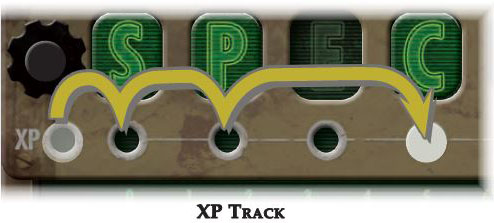
When you level up, you draw two random S.P.E.C.I.A.L. tokens and choose one to keep. If you do not already have that token, add it to your player board.
If you already have that token, you get a perk instead! You return the token to the supply and search the perk deck for the perks that match that token, and then choose one perk to keep.
Perk Cards
Perk cards represent powerful, one-time abilities. To use a perk card, you discard it during your turn to gain the effects described on the card. You cannot discard it while you are still in the middle of performing an action, except for a move action.
Traits
The choices you make during encounters and quests can have lasting effects on you or your reputation in the wasteland. These story details are tracked by trait tokens.
There are six traits tracked across three token types. When you have a trait token, you cannot also have the trait displayed on the opposite side.
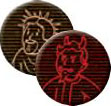
Idolized/Vilified: These traits track what people in the wasteland think of you. If you're idolized, people like you. If you're vilified . . . well, you get it.
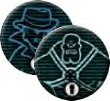
Synth/Super Mutant: These traits indicate whether or not you're a synth or a super mutant.
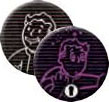
Well Rested/Addicted: These traits track your well-being or dependence on the multitude of drugs available in the wasteland.
When you gain a trait, you take the corresponding token and place it in one of the slots in the upper-right corner of your player board. If you already have that token turned to the other side, flip that token over. You lose the trait on the other side of the token.

However, if the faceup side of a trait token shows a lock icon, you cannot flip that token and do not gain the trait on the other side.
If you are ever instructed to lose a trait, you must discard that token. You can lose a trait even if it has a lock icon.
Well Rested
Most traits have no inherent rules, they simply track things about your character and change what options are available to you and which companions will follow you. The Well Rested trait, however, can be used to gain a benefit:
When performing a test or fighting an enemy, you can voluntarily lose Well Rested to gain one reroll, rerolling any number of the dice.
Factions
There are powerful factions at work in the wasteland, each working toward their own goal. The survivors can choose where and when to help or hinder these factions, but the factions continue to work toward their goals either way.
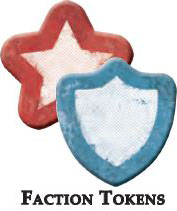
The scenario sheet outlines the two factions in the chosen scenario and shows their current power on a track. The sheet also shows an enemy for each faction. Faction tokens on the map represent the enemy shown next to that faction on the scenario sheet.
When a faction's icon is shown on the bottom of the agenda card drawn for enemy activation, that faction's enemy tokens activate following the same rules as normal enemies.
If an enemy on the scenario sheet shows an "X" or "Y" for a value, that value is determined by the position of that faction's power token. The values of "X" and "Y" are shown to the right of the power track.
Faction Power
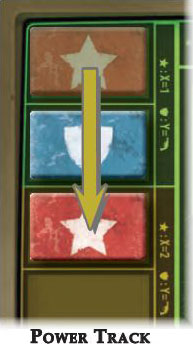
Each faction's current power is shown by the position of its faction token on the track on the left side of the scenario sheet. This can be advanced down the track by survivors completing quests and by the agenda deck being depleted.
Its position affects the value of certain agenda cards and can affect how powerful the corresponding faction's enemy tokens are.
A faction's token can be advanced by the survivors completing specific quests. Any quests that show the  or
or  icons in their results advance that faction's token down the power track a number of spaces equal to the + symbols shown after the icon.
icons in their results advance that faction's token down the power track a number of spaces equal to the + symbols shown after the icon.
Additionally, when the agenda deck is depleted, both factions advance one space down the track.
If a faction's token ever reaches the final space of the track, that faction has gained enough power to take over the wasteland, and the game ends!
If that token advancing granted any survivors enough influence to win the game, they can declare victory and end the game first. If no survivor reached the required amount of influence, the faction that reached the end wins the game, and all survivors lose.
Loyalty
Certain agenda cards indicate that you have gained some favor with one of the factions. These agendas can be used to keep you safe from that faction's agents.

At the start of your turn, you can reveal a  or
or  agenda card from your hand and place it faceup in your play area to declare loyalty to that faction for as long as that card is faceup in your play area.
agenda card from your hand and place it faceup in your play area to declare loyalty to that faction for as long as that card is faceup in your play area.
Declaring loyalty to a faction grants three effects:
Enemies from that faction in your space do not prohibit you from performing any actions.
When enemies of that faction activate, they do not take you into account - they only move toward and fight survivors that are not loyal to their faction.
You cannot attack enemies of that faction.
You can have only one agenda card revealed in this way. If you reveal a new agenda card for loyalty, you must return the previously revealed card to your hand. You may also pick up a revealed agenda card at the start of your turn to withdraw
Continue Reading


